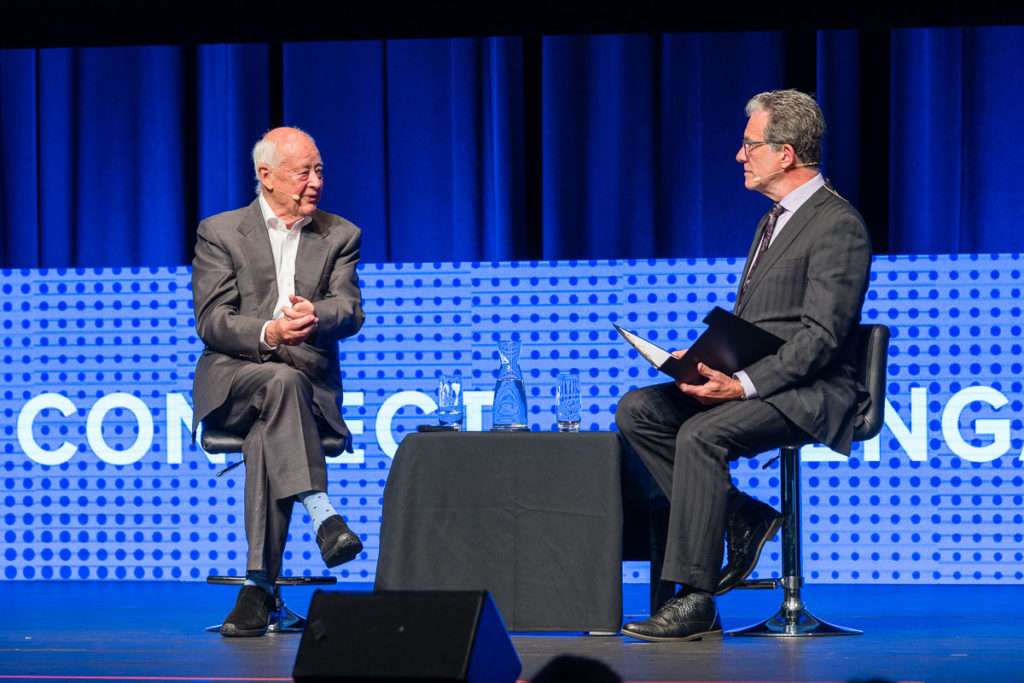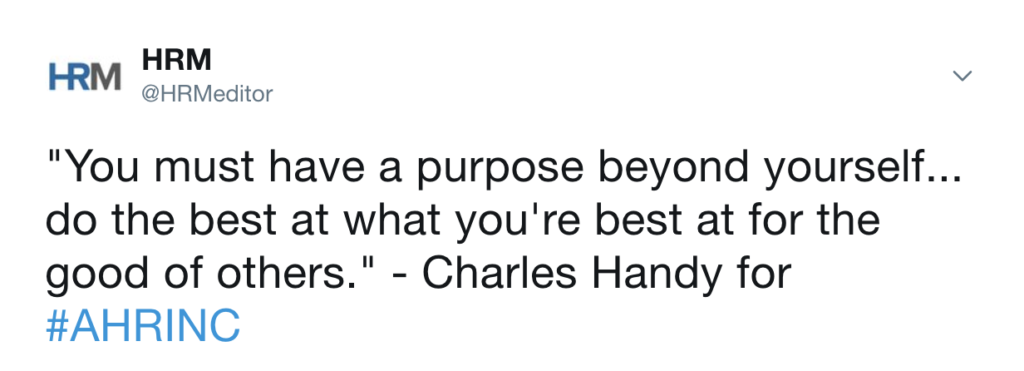Renowned author and philosopher Charles Handy tasks HR with the responsibility of acting as the guardians of humankind.
The audience was primed; you could feel it in the air. Charles Handy’s discussion at the 2018 AHRI National Convention was one that delegates have been holding out for. It’s no wonder, considering he’s penned multiple books on the changing nature of work and sits amongst the top 50 international management thinkers.
It has been 15 years since Handy last visited our shores and for a moment it looked as though we mightn’t receive the pleasure of hearing his sage advice. Just recently he lost his wife Elizabeth, who was a prominent and influential figure throughout his presentation, to a tragic accident. However, when faced with such a loss, Handy said one can either give up or fight on, he chose the latter.
Holding the delegates’ rapt attention, he sets the scene with a story; listening to his children discuss the education of their children during a family holiday in the south of France.
“I was thinking, these poor children don’t know what lies ahead for them. They are woefully unprepared for it,” says Handy. He describes the flaws of traditional education systems, stating “all the important things in life can’t be taught, you can only learn by experience and reflection.”
At a loss for what he could do to help his young grandchildren – who are still years away from entering the workforce – he decided to write them a letter, which inevitably turned into a series of letters (as you’d expect from a writer).
Connect: “You are not a human resource.”
While he doesn’t deny the important role technology will play in our future, he hopes we treat it as a servant, not a master.
“It should enrich our lives, not run it,” he says. “I don’t like the anonymity of algorithms. I don’t know who wrote them. And if they’re wrong, who can we hold accountable?”
He’s told his grandchildren tales of his early years growing up in a small Irish town – without electricity, without running water and without a car to transport them from A to B. He has a vivid memory of the look of astonishment on his father’s face when he used a toaster for the first time. “I went through an enormous amount of technology change in my life, and I’m still here because humans are adaptable.
“I tell my grandchildren, it seems frightening now but you will learn to live with these changes and you will think, how could the world have existed before this?”
He emphasises the importance of the human-to-human experience, stating that you can’t really know a person until you can smell them.
Handy illustrated this point with the example of British Gas, which employs 8,000 plumbers. They underwent an “uberisation” process whereby customers could lodge an online ticket when they needed a plumbing service and a worker would turn up on their doorstep. It was great for the consumer, but not so great for the employee.
“These guys became lonely because they no longer worked in a group. [Their company] had neglected the human side.”
“I won’t work with someone until they’ve got their knees under our desks, so to speak,” he said.
He believes the HR function should switch from managing human resources to becoming the guardian of humanity and, in one of his many letters to his grandchildren, he says “you are not a human resource. You have a name, you have an identity…”
Transform: Handy’s predictions for the future of work
On the convention screen, Handy displayed what he calls “the line of life”, a curved line that shows the peaks and troughs of a human’s time on earth. When people begin to reach their peak, that’s when Handy suggests making a shift into something new; branch off into another life-line by learning and doing something different.
“When you feel comfortable, it’s time for change. Start to think about doing something new… I can’t tell you exactly when it happens, it’s just a feeling you’ll get.”
From an organisational perspective, he says it’s the role of non-executive directors and HR to help companies identify when it’s the right time to start on a new life-line, to help the business to stay on track.
He says most people should experience five of these curves in their life.
When looking to the future of work, Handy says traditional monolithic “employment organisations are coming to an end.” The structural hierarchies will collapse as they’re too expensive to maintain and technology will prevail.
Engage: Nurture your “golden seed”
Handy says at our core we each possess a “golden seed”.
“It’s something you’re able to contribute to the world. You probably don’t know what it is, but someone from the outside can spot it.” That person might be a teacher, a parent or perhaps a friend – Handy suggests that there should be someone in every organisation whose job it is to identify the “golden seed” of others.

“If you know what your golden seed is – and you fertilise and water it – it can give you enormous confidence and you can bestride the world.”
He also speaks of the three different selves that humans have, making up the essence of who they are. This is a theory practiced by his late wife, who created artworks by combining three portraits of an individual that encapsulated the biggest contributors to their identity. In her case the photographer, the homemaker and Charles’ right hand woman.
“People would want their favourite self near [the foreground of the image]. They discover something about themselves that they hadn’t really thought about.”
In your younger years, it might be your career that takes centre stage, this might morph into your family and eventually your passion or hobby might come forward. Handy’s point is that even though we have different focal points at different stages of life, those three aspects always reside within us and it’s important that we give them equal time.
“Your three different selves [need to be] portrayed in a balanced way…. if my grandchildren were in your care, I’d like to think you wanted them to have a rich and balanced life.”
Handy left the audience with food for thought, asking: “Can I trust you with my grandchildren? Who else will make sure that the humans prevail over technology?”
A big task indeed, but one that HR should be prepared to take on.
Are you up for the task? Become a Certified HR Practitioner – find the best certification pathway for you with the online HR Certification Pathfinder.



Charles Handy is helping us see the light (read also Steve Browne’s HR On Purpose). Championing a ‘human centred’ focus to all that a business does is an important step in this and we must be prepared to be passionate about it. Note: at its simplest, passion means what we are prepared to suffer for. As a profession, HR should therefore be prepared to suffer the slings and arrows as the vanguard of professional leadership on this paradigm and bring it into everyday business language no matter their size…otherwise, who will? Thanks for igniting the conversation here AHRI and Kate… Read more »
Thanks for sharing these insights and such a shame i could not hear him live. The ending statement is so powerful and really reminds me of the importance of the job I have is to ensure we are regularly reminded of our humanity, we are caretakers/gardners looking for the flickers of these seeds which we fertilise with connection, collaboration and above all creativity (after all that is what makes us human)!!
Agree with Charles Handy…(I have never liked the term Human Resources – did it arise from a mechanistic view of organisations?). I like his views on reflection and reinvention (connection and transformation)… “when people begin to reach their peak, that’s when Handy suggests making a shift into something new; branch off into another life-line by learning and doing something different.”
I agree with Charles that “the HR function should switch from managing human resources to becoming the guardian of humanity.” I would like to see more discussion on the philosophical role that HR needs to play now, and in the future.
I’m sad to have missed this opportunity to listen to Charles. I have been a fan of his work for a long time. Reading this today reminded me of an article written by Kerr Inkson called ‘Are humans resources?’ which really resonated with me. The article discusses the impact of the metaphors of ‘human sources’ and ‘human resource management’ on people’s development and careers within organisations. While this particular article has a specific focus on academic careers I think it has some very translatable points that colleagues may be interested in. Inkson, K. 2008. Are humans resources? Career Development International,… Read more »